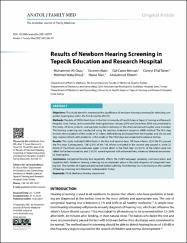| dc.contributor.author | Oruç, Muhammet Ali | |
| dc.contributor.author | Alan, Yasemin | |
| dc.contributor.author | Mercan, Gül Caner | |
| dc.contributor.author | Taner, Cüneyt Eftal | |
| dc.contributor.author | Öncel, Mehmet Yekta | |
| dc.contributor.author | Alan, Murat | |
| dc.contributor.author | Öktem, Abdülmecit | |
| dc.date.accessioned | 2023-06-02T13:18:27Z | |
| dc.date.available | 2023-06-02T13:18:27Z | |
| dc.date.issued | 2021 | en_US |
| dc.identifier.citation | Oruç, M. A., Alan, Y., Mercan, G. C., Taner, C. E., Oncel, M. Y., Alan, M., & Öktem, A. (2021). Results of Newborn Hearing Screening in Tepecik Education and Research Hospital. The Anatolian Journal of Family Medicine, 4(1), 68-73. | en_US |
| dc.identifier.issn | 26305593 | |
| dc.identifier.uri | https://doi.org/10.5505/anatoljfm.2021.83997 | |
| dc.identifier.uri | https://hdl.handle.net/20.500.12513/5123 | |
| dc.description.abstract | Objectives: This study aimed to emphasize the significance of newborn hearing screening for detecting congenital hearing loss within the first 6 months of birth. Methods: The data of 5399 infants born in the Izmir University of Health Science Tepecik Training and Research Hospital, Izmir, Turkey, and screened for hearing between January 2018 and December 2018 was presented in this study. All term, preterm, and asphytic newborn deliveries in the aforementioned hospital were included. The hearing screening was conducted using the auditory brainstem response (ABR) method. The first step involves the evaluation of the results of all infants before being discharged from the hospital and, the second step involves infants with problems in the results of their first step and subjected to advance testing. Results: This study included 5399 infants in the first and second steps. Of these infants, 5231 (96.9%) passed the first step. Consequently, 136 (2.5%) of the 168 infants evaluated in the second step passed it, while 32 (0.6%) of the infants were evaluated again in more detail in the third step. Six (0.2%) of the infants were not called for further evaluation, and 5 (0.2%) were diagnosed with advanced/very advanced bilateral sensorineural hearing loss. Conclusion: Congenital hearing loss negatively affects the child's language, speaking, communication, and cognitive skills. Newborn hearing screening has an important place in the early diagnosis of congenital hearing loss. The number of diagnosed and treated babies suffering from hearing loss is increasing as the number of hearing screening tests becomes widespread in Turkey. © Anatolian Journal of Family Medicine 2021. | en_US |
| dc.language.iso | eng | en_US |
| dc.publisher | Kare Publishing | en_US |
| dc.relation.isversionof | 10.5505/anatoljfm.2021.83997 | en_US |
| dc.rights | info:eu-repo/semantics/openAccess | en_US |
| dc.subject | Child | en_US |
| dc.subject | Deafness | en_US |
| dc.subject | Hearing impairment | en_US |
| dc.title | Results of newborn hearing screening in tepecik education and research hospital | en_US |
| dc.type | article | en_US |
| dc.relation.journal | Anatolian Journal of Family Medicine | en_US |
| dc.contributor.department | Tıp Fakültesi | en_US |
| dc.contributor.authorID | Muhammet Ali Oruç / 0000-0002-4320-8579 | en_US |
| dc.identifier.volume | 4 | en_US |
| dc.identifier.issue | 1 | en_US |
| dc.identifier.startpage | 68 | en_US |
| dc.identifier.endpage | 73 | en_US |
| dc.relation.publicationcategory | Makale - Uluslararası Hakemli Dergi - Kurum Öğretim Elemanı | en_US |


















